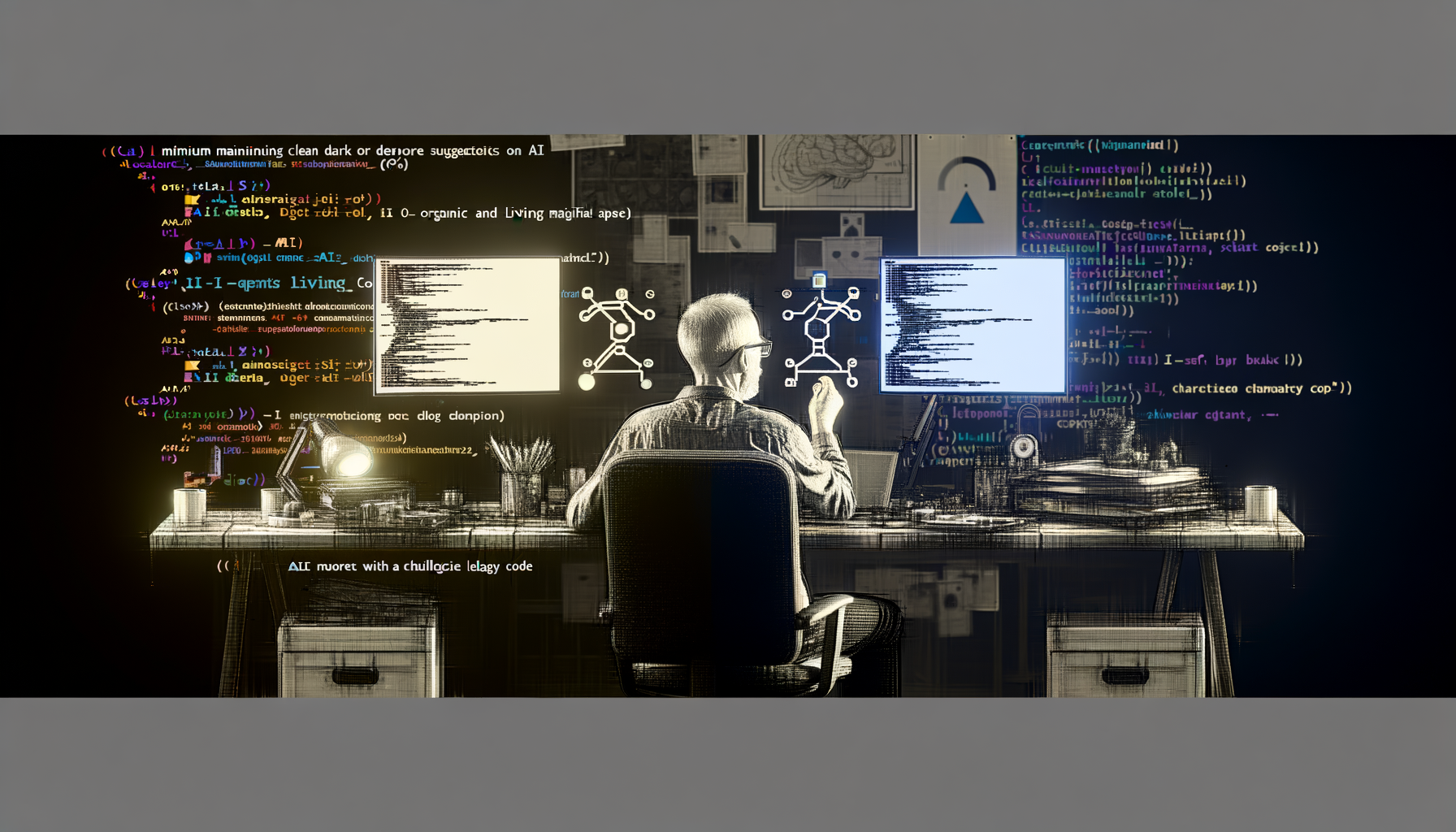Developers everywhere thought AI would turbocharge their workflow, but new evidence reveals it’s actually making veteran coders slower—and nobody saw it coming. What’s really holding back the brightest in tech?
The Astonishing Data Behind The Productivity Paradox
AI-powered coding tools promised an era of breakneck productivity, transforming how we develop, deploy, and maintain software. Yet, underneath the marketing and conference hype, a sobering statistic emerged: experienced developers are 19% slower with AI tools than without.
This flies in the face of every prediction and challenges the narrative that AI equates to automatic acceleration for high performers. How did we get such a counterintuitive result?
The Productivity Promise: Where Did We Go Wrong?
Emerging AI tools like GitHub Copilot, ChatGPT, and Claude have been lauded for their uncanny ability to write, refactor, and review code. The vision was tantalizing: automate the mundane, boost creativity, and eliminate bottlenecks. Less time on grunt work, more time on meaningful innovation—right?
- Mundane tasks automated—no more repetitive syntax and boilerplate.
- Instant code suggestions—“Smart” assistance a tab away.
- Seamless integration—plugged into editors, repos, and cloud pipelines.
Executives, investors, and even developers themselves bet big on these outcomes. They invested in upskilling, retooled workflows, and set aggressive KPIs on AI-augmented output. With user adoption surging and the tools’ capabilities expanding, the expectation was nothing short of superhuman velocity.
But reality hasn’t matched the script. Productivity for seasoned professionals hasn’t soared. Instead, it’s been quietly declining.
Unearthing The 19% Slowdown: What’s Actually Happening?
Several empirical studies and user telemetry now confirm what senior engineers report anecdotally: integrating AI tools into advanced workflows introduces unanticipated drag rather than lift.
“The more you know, the more AI gets in the way.”
But why do the best developers—those who should benefit most from shortcuts—end up 19% slower when AI enters the picture?
- Context-switching overload. AI tools require mental juggling between prompt crafting, code reviewing, and integrating suggestions, fragmenting concentration that is critical to expert performance.
- Cognitive friction. Reviewing and validating AI-generated outputs takes time—and deep mental energy—especially for nuanced projects. Even small errors can cascade, forcing rework or manual fixes.
- Loss of flow. AI suggestions break immersion. The best developers rely on deep, extended focus; AI interrupts this with continual stops and starts.
- Overhead of tool management. Learning how to effectively use emerging AI features, output tuning, and dealing with false positives eats time with uncertain ROI.
The tools simply aren’t smart enough about context, business logic, or codebase idiosyncrasies. AI still feels, to many experts, like an overeager junior assistant: occasionally helpful, but too often needing oversight, correction, and hand-holding.
Debunking the Myth: “AI as Universal Productivity Engine”
Most telling is the mismatch between actual needs and AI’s present capabilities. Here’s how the paradox plays out:
- Junior and mid-level developers—do see time savings from AI, since the majority of their work involves straightforward, pattern-driven coding where generative AI excels.
- Senior and expert developers—are penalized because their workflows are more creative, domain-specific, and require a type of judgment AI can’t replicate.
For the most advanced, time is not wasted on writing for-loops, but on tasks like architecture, system design, debugging subtle defects, and understanding legacy systems. AI’s “helpfulness” here quickly becomes a hindrance.
Case Studies: First-Hand Friction With AI Tools
Case 1: The Refactoring Trap
One principal engineer described spending an extra hour traversing and validating every AI-generated change for a major refactoring project. What should have been a two-hour sprint became an all-day ordeal—half the annotated code “helpfully” injected by AI didn’t account for business invariants or pre-existing architectural decisions.
Case 2: Dependency Disasters
An AI-assisted code completion tool provided a “solution” to an integration issue but imported outdated packages, quietly introducing security vulnerabilities. The developer caught the issue—but only after a protracted review, time that wouldn’t have been spent if relying on their own toolkit and memory.
Case 3: Meeting Deadlines? Not Quite
A team lead outlined how AI-generated code snippets saved time on stand-ups, only to realize the review-rework cycle repeatedly offset any net gain. “Quick wins” were often more costly to maintain.
Why Is This a Paradox—and What Does It Really Mean?
Productivity isn’t measured by lines of code or velocity—it’s measured by meaningful outcomes and sustainable, error-free progress.
The assumption: more automation + smarter tools = faster work. But for high-skill tasks, the opposite effect dominates: AI increases process friction, dilutes focus, and amplifies rework risk.
This paradox challenges three popular beliefs:
- That AI’s outputs are good enough for solo use. (They aren’t, for experts.)
- That more code means more productivity. (False, especially for architectural and business-critical work.)
- That tool upgrades always reduce time-to-value. (Not when cognitive overhead offsets gains.)
Underlying Causes: The Mechanics of Workflow Drag
Let’s dig deeper into what’s structurally causing experienced professionals to slow down as they try to “augment” with AI:
- AI still has situational ignorance. It isn’t yet aware of the full domain context, project constraints, or nuanced system behavior—forcing humans to do the bridging work.
- Shallow code understanding. Surface-level suggestions can’t address deep-rooted design or subtle complexity (yet).
- Prompt design is a new cognitive task. Getting valuable output takes skill—but the creative cost of writing precise prompts is real, and often undervalued.
- Review cycles balloon. More suggestions mean more to vet, increasing the code review burden instead of reducing it.
AI’s current skill is breadth, not depth. For high-complexity tasks, this becomes a liability, as the marginal cost of oversight outstrips any basic time savings.
What Should We Do? Rethinking How We Measure and Apply AI in Expert Workflows
Focus on Augmentation, Not Automation—for Experts
The industry needs a more nuanced model: for expert practitioners, productivity is less about speed and more about reducing mental burden and error rates without sacrificing quality.
- Let AI handle low-stakes boilerplate and rote scripting.
- Design workflows that isolate and sandbox AI-suggested code before merging.
- Invest in tools that adapt to human context, not force humans to adapt to the tool.
- Let experienced developers be the “final judge”—AI should aid, not interrupt their flow or undermine their judgment.
There’s no shortcut for expertise. The current paradox exists because tools are treating all developers the same, rather than recognizing where the ceiling for AI support currently lies.
Looking Forward: Unlocking The Real Potential of AI for Senior Engineers
If we want AI to truly unleash expert productivity, future tools must:
- Incorporate richer project and organizational context automatically.
- Learn from codebase patterns, company-wide standards, and real-world deployments—not just example code.
- Minimize context-switches and allow deep integration into custom workflows.
- Prioritize explainability and trustworthy suggestions, not volume or speed.
This may require a reimagining of both tool architecture and the metrics we use. Productivity metrics must evolve from “code written per hour” to “defect-free innovation per hour.” Only then will AI become a true amplifier for the highest-skilled professionals.
The Real Takeaway: Rethink, Don’t Abandon, AI in Development
AI-assisted development still offers huge opportunities. But we must be honest about how and where it creates friction for the most skilled, and we must redesign our expectations, our metrics, and our tools accordingly. The productivity paradox isn’t a death knell for AI in coding—but it’s a reality check and a blueprint for what comes next.
AI can only boost productivity for senior developers when it augments their expertise, not when it slows them down with hidden workflow costs.





